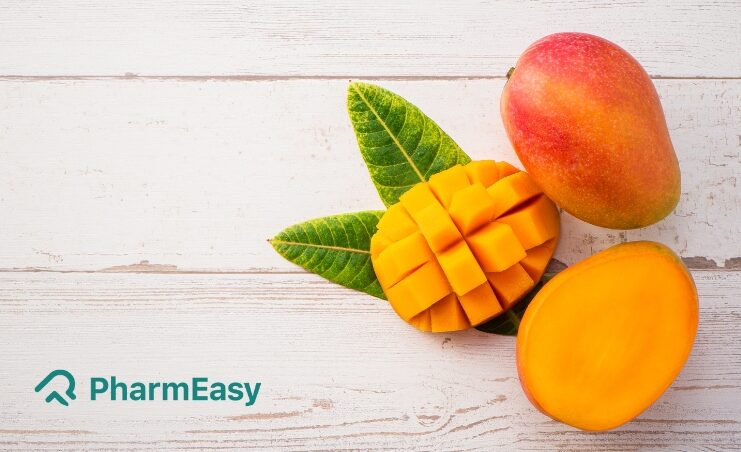Can You Eat Mango Skin? Unraveling the Truth with Scientific Evidence
By Dr. Nayana Shetty +2 more

Get more insightful and
helpful tips to
treat Diabetes for FREE



Download PharmEasy App




Register to Avail the Offer
Send OTPBy continuing, you agree with our Privacy Policy and Terms and Conditions
By Dr. Nayana Shetty +2 more
Table of Contents
Mango is a tropical fruit loved worldwide for its sweet, juicy flesh. But is its skin edible? Is it beneficial for health? In this article, we will delve into the possible good and bad effects of eating mango skin.
We will explore what is in the mango skin and its impact on your health. We will also discuss if you should eat it and how to do so safely. Lastly, we will answer commonly asked questions regarding this topic.

Did you know?
The consumption of mango peel or skin hinges on personal likes and health worries. Below we have discussed the nutritional value, and potential health benefits.
Before studying the possible benefits of eating mango skin, below we have discussed its nutritional value which is as follows.
These benefits add to the overall positive role that mango skin may play in one’s health.
There may be many possible benefits that may occur due to the consumption of mango skin due to its rich nutrient content. They are as follows.
Dietary fiber in mango skin is significant for weight control. Studies have found that:
Antioxidants in mango skin battle free radicals, which harm body cells by causing oxidative stress. Lower oxidative stress has been tied to the following.
The possible downsides tied to eating mango skin are as follows.
Mango skin has a chemical named urushiol, also found in poison ivy and oak. Urushiol can trigger allergies in some people. Signs include the following.
To deal with these allergies, over-the-counter allergy medications, and anti-itch creams may be used. But, best to avoid mango skin if you know you’re sensitive to urushiol.
Fruits and vegetables can be sprayed with pesticides to guard against bugs and sickness. Eating mango skin increases the odds of taking in pesticide traces. These traces are tied to health issues such as the follows.
Washing mangoes well before eating the skin is crucial to reduce pesticide-related risks.
Some might not like the taste and feel of mango skin due to the following.
Whether to consume mango skin or not depends on the above mentioned factors, one should see if it favours your health needs, if you are allergic or not, if it is pesticide free, and also personal likes and dislikes.
If you choose to eat the skin, make sure it’s prepared and eaten safely.
With proper preparation, eating mango skin may be a fun and healthy addition to many dishes.
So, eating mango skin brings a range of good and bad effects. Mango skin is packed with health-aiding elements such as fiber, vitamins, and antioxidants. These may aid weight control and overall well-being. But, possible risks include allergies and exposure to pesticide traces.
The choice to eat mango skin hangs on personal factors such as allergies and taste. If you choose to consume it, prepare the skin the right way. This includes washing it well and adding it to recipes to hide its taste and feel. In the end, it’s key to make a choice that’s best for your unique health issues and personal likes.
Mango skin is filled with fiber, vitamins, and antioxidants that boost overall health. However, it can trigger allergies or contain pesticide traces. If you wish to consume it, prepare it safely by washing it well.
Peeling a mango reduces the chance of allergies and coming into contact with pesticide traces. However, if you’re not allergic and clean the skin well, you may choose to eat it for its nutrient content.
Being able to munch a whole mango along with the skin is generally safe. However, the skin could trigger allergies in some and could also carry pesticide traces. Make sure to wash the mango well before eating the skin.
Mango skin is rich in antioxidants and nutrients that may aid overall wellness, including skin health. Yet, the direct role of eating mango skin on skin health isn’t well document.
To bring down the pesticide traces on mango skin, wash your mangoes well with water or use a cleaner made for fruits and vegetable. Good washing helps get rid of any traces and makes for safe eating of the mango skin.
Disclaimer: The information provided here is for educational/awareness purposes only and is not intended to be a substitute for medical treatment by a healthcare professional and should not be relied upon to diagnose or treat any medical condition. The reader should consult a registered medical practitioner to determine the appropriateness of the information and before consuming any medication. PharmEasy does not provide any guarantee or warranty (express or implied) regarding the accuracy, adequacy, completeness, legality, reliability or usefulness of the information; and disclaims any liability arising thereof.
Links and product recommendations in the information provided here are advertisements of third-party products available on the website. PharmEasy does not make any representation on the accuracy or suitability of such products/services. Advertisements do not influence the editorial decisions or content. The information in this blog is subject to change without notice. The authors and administrators reserve the right to modify, add, or remove content without notification. It is your responsibility to review this disclaimer regularly for any changes.
Comments